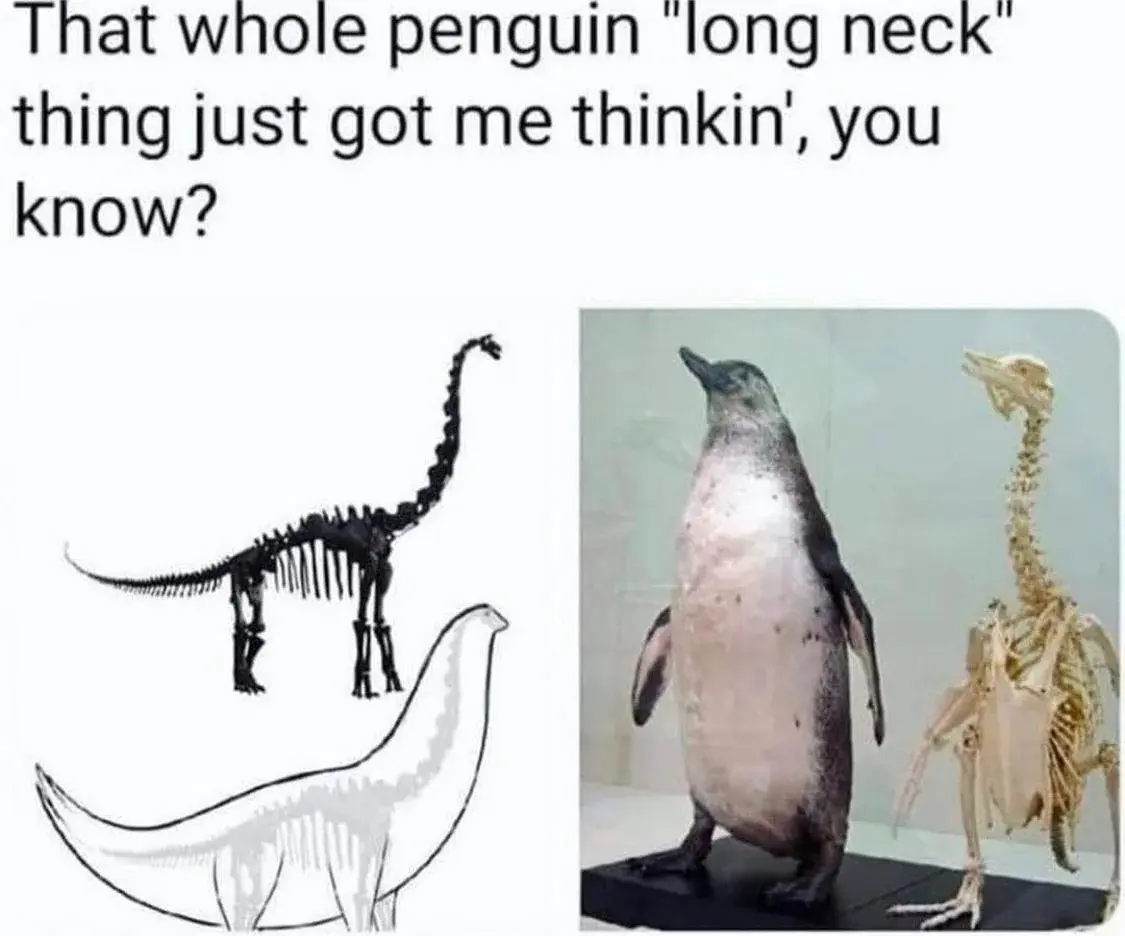I remember someone mentioned online that the reconstruction of animals are more complicated than just tracing the bone line.
I am very interested if some experts are willing to tell us more.
Since none chimed in (in the past 6 minutes) , I, an idiot, will share what I think I know. When reconstructing the faces of people from a skull, either with clay or software, they model the various tissues–muscles, fat, skin, etc according to models based on samples. How they would do this for a creature that isn’t very like any current living creature I don’t know. It is probably educated guesswork?
I just read an article on this process for a neanderthal and in that particular instance they used data from humans since I guess it was close enough.
But, for example (referencing a recent meme) how do they know spinosaur had a sail and not a hump back and neck muscles like a buffalo?? Seriously though I’m sure they can tell which bones have attachment points, how much force they can withstand, etc.
Over the last few decades there have been massive improvements on telling which bones have attachment points for muscles and hints at how strong the muscles are likely to be, but it takes a long time to replace all of the existing artwork with newer and more accurate artwork.
Even with improvements to the muscle structure, any part of the body that has fatty buildup like breasts would be missed without soft tissues being preserved. I am fairly certain that a hippos nose and lip area wouldn’t have enough detail to reconstruct accurately. Heck, tyrannosaurs most likely had lips to cover their teeth, but that is based on other animals with similar teeth all having lips to protect the teeth from dryness and rot that doesn’t apply to crocodiles who live in a very wet environment.
As another idiot, there is a difference between tusks and teeth. They are different, tusks don’t contain enamel for example and I think aliens could also determine this difference. It’s rare for teeth to stick out like in the reconstruction.
They would also be able to determine that hippos can open their mouth extremely wide. Making it more likely for the long “fangs” to be at least partially covered and not exposed like the tusks of elephants.
Often, dinosaurs are depicted with mouths showing their tooth. This is debated and more and more scientists think they had closed mouths, like most animals today.
Other than that, the proposition of fat is very hard to reconstruct. Reconstructing a hippo you would have other mammals in mind and reconstructing dinosaurs, scientists take reptiles but they could as well take birds so this is a big question.
For context: I’m an idiot too
I’ll be honest, I double-checked your username to make sure I’m not going to read about Undertaker at the end
They can get some idea from the bones of muscle attachment points and how strong of a muscle would have been attached.
Actually this is how we’ve been reconstructing dinosaurs. They’re probably all very wrong.

I want to believe…
Then you have physcs and how much weight the bones can lift before breaking.

We need to bring back the chonkosaurs

T. rex may have had lips, for example
Luscious kissable lips?
Lusty Cretaceous Maid
😗
I dont care how scientifically accurate Dino’s with bird feathers are, they will never be as cool as the Jurassic park dino of my childhood
IIRC the current theory is that many (likely most) had feathers but few of the large ones had actual wings beyond just a row of longer feathers on the forearms. The bodily structures that allow flight are absent on the vast majority of dinosaurs so it’s thought they mostly used their arm feathers as rudders for better control when running (which the ostrich and other large flightless birds still use). However, it is thought that some smaller species likely did have wings which they used to glide much like a flying squirrel. Eventually they evolved larger chest muscles and a keel for attaching said large muscles, and at that point you could reasonably just call them birds, which are to this day a subset of dinosaurs.
Birds are dinosaurs because taxonomy as a field is fundamentally based on garbage pseudoscience
But even with more modern methods like cladistics and genetic analysis, birds are still found to be directly descended from contemporary dinosaurs.
And the taxonomic rule that any animal is also all of its ancestors is garbage science.
That’s not “science,” that’s just an arbitrary convention that can help simplify communication of complex toppics. The genetic data that the convention is derived from is the science, in the form of a lineage of genetic relations between organisms and nothing else, because biology has exactly zero built-in categories or labels, and those are all human-made.
Exactly, it’s not science. And it’s not helpful either. It doesn’t simplify communication. The representative conventions of taxonomy are not derived from evidence, they’re derived from the irrelevant feelings of taxonomists hundreds of years ago who didn’t understand how the world works. It’s pseudoscience. Pointless tradition masquerading as a legitimate exploratory endeavour.
Spoken like someone who thinks Pluto should still be considered a Planet.
But you are right, Jurassic Park would be a completely different movie if Genaro was eaten my something that looked like an oversized quail.
Pluto will forever be a planet in our hearts…
Pluto is a planet
It’ll always be a planet in our hearts.
And what about Ceres and Eris then? Planets too?
Yup!
Now, whether or not they meet a specific criteria for a specific standard used in a scientific field is not in debate. Obviously, the standard for what defines a planet in a given field of study is applicable in that field.
However, for the rest of us, we don’t have to use that standard. See, using a language for something lile science is filled with this kind of thing when you use a living language that’s why Latin is so often the default for situations where you need fixed definitions. Otherwise, you deal with this issue constantly.
Though, tbh, even that’s no certain protection because people will borrow words, or misuse them just because we’re essentially a bunch of parrots playing with sounds sometimes. Lol at what happened with words like idiot or moron. They used to have a fixed, certain meaning with a standard used to apply them. Now they’re just insults.
The “planets” have existed in the public awareness with a much looser definition than what is used in scientific fields. Pretty much anything can be a planet in colloquial usage, so long as it orbits the sun. Now, I believe most people would insist on a lower size threshold where something is no longer a planet, but some other term. The problem is that there’s not a consensus on that lower limit.
With ceres and eris in specific, most people that are aware they exist are gong to be into “space” in some way, maybe even professionally. That makes the usage of planet for them less common than for Pluto, but the more casual the interest in such things, the more likely they are to get lumped in as “the 10th planet” or 10th and 11th, depending on who is saying things.
But, for casual conversation, I’d say that all three are planets. I’d have to look up the standards again because I’m fucking old, but I would also be just fine with someone calling them dwarf planets, or planetoids, or whatever.
Seriously. Until someone is just outright ignoring common usage and making up definitions nobody else uses, this kind of thing is just part of the fun of being monkeys that make complex sounds. None of us are obligated to use jargon definitions in casual settings, and trying to force that is not only pointless, it’s sometimes rude.
I’m all for it, let’s get more planets!
Everything’s a planet!
“Planet” in my book is anything that’s too big to just be a large lumpy rock. Something with sufficient gravity to pull itself into the shape of a sphere.
The idea of planets needing to orbit in eliptical orbits on a plane, or clear their own paths is a bias from living in a stable planetary system, but much of the planetary systems and indeed much of the universe doesn’t have the stability that exists in this local area, it’s especially the case in younger planetary systems as well as much older ones.
Also many planets in the universe don’t even have stars, they are rogue, scattered throughout the darkness between the stars.
It’s starting to look like rogue planets are the more common ones and us stellar orbiters are the weirdos
Just goes to show how much the universe is a chaotic and cruel place, hopefully we won’t end up joining them in the cold dark void in our future.
The book All Yesterdays explores this
Just purchased. Now it will languish in my iBooks library with other illustrated books until some time in the distant future…
It’s a while ago. Now they’re probably pretty accurate.
They might look cute and cuddly, but hippos are freaking mean. And they hold grudges longer than a snubbed karen-in-law
I mean, the alien reconstruction is like looking into the soul of the hippo
Yes, it captures the essence of the animal perfectly right.
The Alien Picture of Dorian Hippo.
Mandalore: “I would believe a hippo has boss phases in real life.”
They are also faster than they look.
I don’t get how they can have so much energy to move such a bulky body quickly. Aren’t they also herbivores?
They are, but they spend most of their time in the water, so they aren’t supporting their own weight.
Every once in a while one of them forgets they aren’t top of the food chain, and attempts to fight an elephant. That goes poorly for the hippo.
Aren’t they the most deadly wild animal? (because people think they are like cattle and get too close)
I’m not sure most deadly animal is right, but they’re definitely top five. Mothers also supper protective of children and males are hyper territorial.
deleted by creator
I dunno, I think aliens would be smarter than that and we’re projecting our history of being overly simplistic on our dino reconstruction. Why put it on the aliens? It’s already an us issue.
Because the post is not about aliens. It’s about people. Aliens serve here to help you see the problem from the outside, to not use what you know about the animal. It’s supposed to show you the reflection of our way of thinking about fossils.
How can anyone say that an Alien archeologist would make the same minimalist assumptions that humans have made as opposed to making their own assumptions about the muscle and cartilage structures based on the creatures they’re familiar with or current creatures alive on earth at the time.
Don’t fixate on the alien part. That part is not supposed to be realistic, because it doesn’t really represent aliens - it represents us people.
It’s the same kind of alien trope used in Star Trek to represent different aspects of humans. It’s not what aliens would probably really be like (trully alien).
It’s a tool for illustrating human behaviour and it works decently well.
Uh oh… Looks like SOME alien got offended…
I am and I am!
Did you know the bite force of a hippo is 1820 psi? For comparison, the bite force of a lion is 650 psi, which could easily crush your rib cage as it can only withstand 630 pounds of force.
Imagine a hydrolic press pushing a coke can through your leg.
Is Pepsi okay?
It’s fine I’ll have water
[…] which could easily crush your rib cage as it can only withstand 630 pounds of force.
…How is this known? Also is that calculated with the skin/muscle/connective tissue buffer in mind? If so, that honestly raises even more questions…
There is a method of execution known as pressing, which was the crushing of someone under immense weight. One famous example occurred during the Salem witch trials where a man, not a woman, got so sick of salems bullshit that he refused to talk when questioned and so the town tried to get a confession out of him by stacking rocks on top of him, with the only response being “more weight”. He eventually died from the crushing pressure of the rocks. Another famouse example involves an elephant crushing a person, though it was common to crush the limbs then the head.
Thanks! I was aware of that execution method, but I’ve never read of a precise amount of weight employed in the process.
The reason he refused to talk is that they were demanding he plead guilty or not guilty for being a witch. The accusers wanted his land, and if he was found guilty his land would be forfeited. But since he refused to plead, he couldn’t be legally found guilty, and his land was inherited by his kids. He was looking out for his family even if it meant a torturous death.
How is this known?
Scale in mouth, bite?
Honestly, knowing what I know about the last slide, it might as well be the middle slide.
How it looks: This creature would use it’s oversized teeth to impale it’s prey and it’s massive muscles gives it a crushing bite.
The truth: I eata da plant
The truth: I eata da plant and also indiscriminately murder everyone who comes too close.
And then eat the meat sometimes
They only eat meat that’s already been killed – the perfect flexitarians
But since they indiscriminately kill whatever is close enough, they may supply themselves with said “meat that’s already been killed”
Oh hey, it’s Tusky Tooth, the cryptid mascot of the Alabama turn named after him.






















